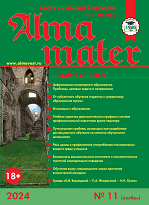Mikhail V. Popugailo, Cand. Sci. (Medicine), Docent, Associate Professor of the Department of Pathological Physiology, Ural State Medical University, Yekaterinburg city, e-mail: pathophis@yandex.ru, https://orcid.org/0000-0003-4820-5964
Dmitry Yu. Grebnev, Dr. of Medical Sciences, Docent, Head of the Department of Pathological Physiology, Ural State Medical University, Yekaterinburg city, e-mail: dr-grebnev77@mail.ru. https://orcid.org/0000-0002-5698-8404
Maya D. Sorokina, student, Ural State Medical University, Yekaterinburg city, e-mail: sloyka98@mail.ru
Olga A. Beloglazova, student Ural State Medical University, Yekaterinburg city, e-mail: olga.beloglazovawork@gmail.com
Irina Yu. Maklakova, Dr. of Medical Sciences, Docent, Head of the Department of Normal Physiology; Associate Professor of the Department of Pathological Physiology of the Ural State Medical University, Yekaterinburg city, e-mail: makliu@mail.ru, https://orcid.org/0000-0002-6895-7947
The student scientific circle is considered as an effective tool for attracting students to research work, orienting students to professional, intellectual and social creativity, and providing conditions for self-education.
The article analyzes the specifics of the organization of the scientific circle in modern conditions. Some innovations in the organization and holding of meetings of the scientific circle of the Department of Pathological Physiology are described. Although the proposed forms of student involvement in scientific and educational activities do not radically differ from traditional ones, the format of communication, time frames, issues raised at the meetings of the circle, and much more are somewhat modified and unconventional. Thanks to this, it became possible to increase the interest of today’s students in this form of extracurricular work. One of the significant factors of the success of the group work was the involvement of all interested students in the formation of the agenda of the meetings. A sense of belonging is an important psychological factor in choosing to participate in the work of the circle of the Department of Pathological Physiology. The organization of quizzes is an interesting and useful section within the framework of the meetings of the circle. The competitive nature, informal principles, and team format help students deepen their knowledge, allow them to express themselves more vividly, better understand themselves and their emotions, and better show themselves to the world around them.
Certain achievements in the work of the scientific student circle of the Department of Pathological Physiology raise new questions about the need to improve this work.
Keywords: student scientific club, pathological physiology, research activities, university, students, Nobel Prize, Huntington’s disease, quiz
Conflict of interests. The authors declare that there is no conflict of interest.
Funding. The study had no sponsor support.
References
1. Speranskaya, A.N. Scientific circle as a special form of informal communication in Russian science (on the example of the Kapitsa Club). Vestnik of SUSU. Series: Social and Humanitarian Sciences. 2016. 16 (2): 49–53. (In Rus.)
2. Larina, V.N., Kudina, E.V., Mikava, K.R. Analysis of the effectiveness of the student scientific circle of a medical university to prepare students for future professional activity. Cardiovascular therapy and prevention. 2023. 22 (1S): 3409. (In Rus.). DOI: 10.15829/1728-8800-2023-3409 (accessed on: 29.01.2024).
3. Kolodeznikova, S.I., Gulyaev, P.D. On the problem of organizing the activities of a student scientific circle in modern conditions. Scientific notes of the P.F. Lesgaft University. 2018. 11 (165): 146–149. (In Rus.) URL: https://cyberleninka.ru/article/n/k-probleme-organizatsii-deyatelnosti-s... (accessed on: 29.01.2024).
4. Appakova, E.G., Fedorov, O.S. Scientific research activity of students as a factor of increasing competitiveness (socio-philosophical analysis). Vestnik of the Kazan Technological University. 2013. 12. (In Rus.) URL: https://cyberleninka.ru/arti-cle/n/nauchno-issledovatelskaya-deyatelnost... (accessed on: 29.01.2024).
5. Andronov, D.E., Vlasov, R.V., Titova, V.A. The influence of scientific circles on students in the educational process. “The scientific community of students of the XXI century. SOCIAL SCIENCES”: Proceedings of the VI Student International correspondence scientific and practical conference. (December 13, 2012). Novosibirsk: SibAK Publishing House, 2012: 144–148. (In Rus.) URL: sibac.info/archive/social/6.pdf (accessed on: 29.01.2024).
6. Gorgots, O.V. The work of the student scientific circle as a factor in the development of a comprehensively developed personality of a specialist with higher education. In: Pedagogy and psychology: trends and prospects of development. Collection of scientific papers based on the results of the international scientific and practical conference. Volgograd, 2017. 4: 41. (In Rus.)
7. Official website of the Ural State Medical University. URL: https://usma.ru/nauka-ugmu/infrastruktura/nauchnoe-obshhestvo-studentov-... /?ysclid=lqm8md9vnm981507566 (accessed on: 29.01.2024).
8. Mametyeva, O.S., Suprun, N.G., Khalikova, D.A. Research work of university students: effectiveness and problems of organization. Modern problems of science and education. 2018. 1. (In Rus.) URL: http://science-education.ru/ru/article/view?id=27362 (accessed on: 29.01.2024).
9. Ismailova, M.S., Kalyagin, N.I., Popugailo, M.V. Scientific research activities of senior students of UGMU. “From the quality of medical education to the quality of medical care”. Proceedings of the VII All-Russian Scientific and practical conference. From the Federal State Budgetary Educational Institution UGMU of the Ministry of Health of the Russian Federation, in 2 parts. Yekaterinburg, 2018. 1: 279–284. (In Rus.)
10. Sevastyanova, I.K., Ayupova, F.S., Voskanyan, A.R. The role of the student scientific circle in the educational space. International Journal of Experimental Education. 2013. 4: 256–258. (In Rus.) URL: https://expeducation.ru/ru/article/view?id=4788 (accessed on: 29.01.2024).
11. Krivchenko, T.A., Olkhovik, N.V. Model of a modern specialist with higher education. Eurasian Union of Scientists. 2015. 4-12 (13): 41–44. (In Rus.) URL: http://cyberleninka.ru/article/n/model-sovremennogo-spetsialista-s-vyssh... (accessed on: 29.01.2024).
12. For which paleogeneticist Svante Paabo received the Nobel Prize. URL: https://trends.rbc.ru/trends/social/633be3939a794791f480d4d9?from=copy (accessed on: 29.01.2024).
13. How to save the Thirteenth? (Prospects for the treatment of Huntington’s disease). URL: https://biomolecula.ru/articles/kak-spasti-trinadtsatuiu-perspektivy-lec... (accessed on: 29.01.2024).
14. Own game — GameSHOWS.ru (accessed on: 29.01.2024).











.png)






